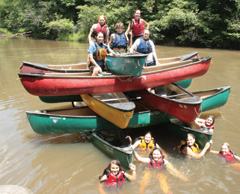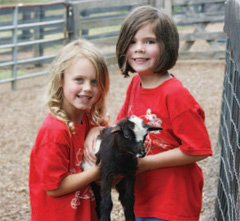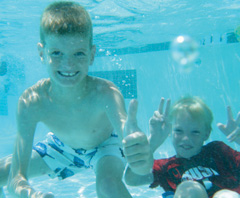Exploring Summer Camps
Choosing the Right Fit for Your Child
by Daniel Beauregard

The metro Atlanta area is filled with great school systems, but it
also boasts a wealth of summer camps to keep your children engaged during their summer vacation. Each year, more theme camps for young chefs or aspiring writers pop up alongside traditional day camps. With dozens of options to choose from, the time to start investigating is now.Your first choice is to decide whether to send your child to a day camp or an overnight camp. The difference between these two types of camps boils down to much more than whether your child comes home at the end of the day.
“Overnight camps are great for kids who are comfortable being away from home and family, who make friends easily, adapt well and are excited about new situations and adventures,” says John Dovic, camp director for High Meadows Summer Day Camp. These camps teach children independence and how to rely on themselves away from the comforts of home.
Day camps, meanwhile, “are a good choice for children and parents who are not completely comfortable being apart for an extended amount of time and for kids who might have other evening or weekend obligations,” he says.
Once you’ve decided which type of camp is best for your child’s age and development, there are a great many options to choose from—many of them specializing in a particular pursuit, such as academics, dance or even circus arts.
Traditional Summer Camps
 When most of us think of summer camp, we envision a strong focus on outdoor activities, such as swimming, archery or canoeing. High Meadows Summer Day Camp offers a traditional camp setting focused on the outdoors and experiential learning, in which campers learn about subjects through direct, hands-on experience. High Meadows, which accepts children ages 3 through 15, offers a range of activities including arts and crafts, woodworking, drama and more. Over a three-week session, campers explore new activities, grow and achieve success. “If they’ve never shot a bow and arrow before, by the end of three weeks they’ll certainly have picked up some skill,” Dovic says.
When most of us think of summer camp, we envision a strong focus on outdoor activities, such as swimming, archery or canoeing. High Meadows Summer Day Camp offers a traditional camp setting focused on the outdoors and experiential learning, in which campers learn about subjects through direct, hands-on experience. High Meadows, which accepts children ages 3 through 15, offers a range of activities including arts and crafts, woodworking, drama and more. Over a three-week session, campers explore new activities, grow and achieve success. “If they’ve never shot a bow and arrow before, by the end of three weeks they’ll certainly have picked up some skill,” Dovic says.Traditional camps give children time to explore their hidden talents and broaden their horizons. And in today’s fast-paced world, it’s important for them to learn that there’s more to life than staring at a computer screen. “We really want the kids to disconnect from a lot of the electronic things that they’re learning in their typical day,” he says.
Enhancing Education
 Other camps allow students to supplement their education by getting ahead or catching up on certain subjects. The Darlington School in Rome, Ga., offers a number of themed camps, including Reading Rockets, which helps students develop their academic skills and become independent readers, and Intercultural Camp, which helps ESL students build their English language skills while learning about cooperation and different cultures.
Other camps allow students to supplement their education by getting ahead or catching up on certain subjects. The Darlington School in Rome, Ga., offers a number of themed camps, including Reading Rockets, which helps students develop their academic skills and become independent readers, and Intercultural Camp, which helps ESL students build their English language skills while learning about cooperation and different cultures.At Camp Discovery, the Children’s School’s day camp, young children tackle art projects, conduct science experiments, go on weekly field trips and follow themed curricula, such as Kreative Kids, an exploration of product development, design, marketing and advertising. Budding Einsteins can attend the Big Thinkers summer day camp, which introduces children to the world of science through a series of experiments, demonstrations and hands-on activities.
 The Bedford School’s Squirrel Hollow day camp is both academic and recreational. Students with learning disabilities between the ages of 6 and 16 receive instruction in reading, math and other areas to ensure that they don’t struggle during the coming school year. They also participate in recreational activities and work on building their social skills.
The Bedford School’s Squirrel Hollow day camp is both academic and recreational. Students with learning disabilities between the ages of 6 and 16 receive instruction in reading, math and other areas to ensure that they don’t struggle during the coming school year. They also participate in recreational activities and work on building their social skills.“The students are able to get the academic help they need and the exercise they enjoy,” says Betsy Box, camp director and founder of the Bedford School.
Pursuing Your Passion
Other camps afford children the opportunity to pursue a particular interest or passion. The Atlanta Young Writers Institute (AYWI), a nonprofit organization that fosters and develops the skills of adolescent writers, hosts a week-long writing workshop for seventh- and eighth-graders and a two-week intensive writing course for high school students.
“We also have professional writers visit the classes and do team-building because we want to build a sense of real community among students,” says founder Leslie Quigless.
Themed camps at the Darlington School include Artistic Expressions, an exploration of music, drama and arts and crafts, along with a musical theater camp and camps focused on cheerleading, fencing, tennis and other athletic activities. Participants at Circus Camp explore their creativity while learning about circus, performing and visual arts, with activities including juggling, magic, acrobatics and more.
The Young Chefs Academy (YCA) hosts camp sessions centered on such themes as baking with chocolate or Cupcakepalooza, in which students tackle savory and sweet cupcake recipes. The camp caters to a wide age range, from high school students to 4-year-olds.
“Even at the age of 4 and 5, a lot of kids love to participate in the kitchen in some way, shape or form,” says YCA’s Jennifer Fox.
Making Your Decision
 Once you’ve decided on the best kind of camp for your child, it’s time to narrow down your options. Referrals from other parents are a good start, and a little Internet research is crucial.
Once you’ve decided on the best kind of camp for your child, it’s time to narrow down your options. Referrals from other parents are a good start, and a little Internet research is crucial.The American Camp Association’s website (www.acacamps.org) is a great resource, with more than 2,400 accredited camps.
When considering a camp, speak to an administrator or camp director, and ask the same kind of questions you would ask of a potential school. “Who are the counselors?” asks Dovic. “What is the camp’s philosophy? Do the camp policies and procedures match parent expectations?”
Armed with the right information, you’re sure to find the right match for your child, and enroll them in a summer camp experience that’s both enriching and life-changing.
ASK AROUND
Five things to ask friends and staff before signing off on a summer camp:
- What is the camp’s local history and reputation?
- How are counselors trained? Are they certified or accredited?
- What is the background of the director and leadership staff?
- How does the camp articulate its role in child development?
- How does the camp address safety concerns? Is there adequate supervision at all times?







